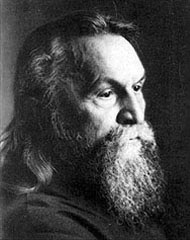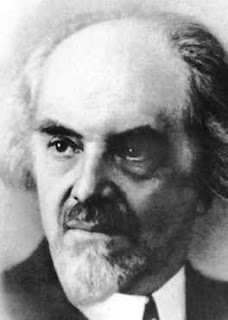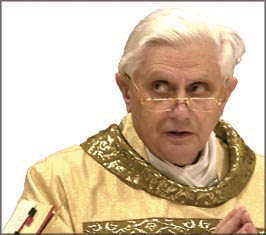 In a brilliant essay “Heroism and Asceticism,” written about the Russian Revolution of 1905, Sergius Bulgakov analyzed, to their ire, the religiosity of the so-called Russian atheistic intelligentsia. First and foremost, he believed that they took many spiritual principles from their Orthodox heritage; when taken out of their proper context, however, these principles, holistic in the Orthodox faith, are out of balance, easily abused, and end up turning what was once good into an evil. More importantly, to oppose the Church, they became a Church of their own. Bulgakov showed how the caricature they made of the Orthodox Church fit themselves more than it did the Church. “What is most striking about Russian atheism is its dogmatism and, one might say, religious frivolity with which it is adopted” Sergei Bulgakov, “Heroism and Asceticism” pages 23 – 63 in Landmarks.trans. Marian Schwartz (New York: Karz Howard, 1977), 30. Moreover, to promote their utopian vision, political theorists require heroes dedicated to the good of humanity to sacrifice themselves so they can be turned into martyrs for the faith: that is, by their willingness to sacrifice themselves, these heroes encourage others to follow their example, and to do whatever is necessary to help create utopia. “Heroism strives to save mankind by its own powers and by external means; hence their expectional regard for heroic acts that embody the program of maximalism to a maximal degree. Heroism preaches the necessity of causing something to happen, accomplishing something beyond one’s strength, and, in the process, to give up what is most dear, one’s own life. One becomes a hero and, at the same time, a savior of mankind through an heroic act far beyond the bounds of ordinary duty” (ibid, 39).
In a brilliant essay “Heroism and Asceticism,” written about the Russian Revolution of 1905, Sergius Bulgakov analyzed, to their ire, the religiosity of the so-called Russian atheistic intelligentsia. First and foremost, he believed that they took many spiritual principles from their Orthodox heritage; when taken out of their proper context, however, these principles, holistic in the Orthodox faith, are out of balance, easily abused, and end up turning what was once good into an evil. More importantly, to oppose the Church, they became a Church of their own. Bulgakov showed how the caricature they made of the Orthodox Church fit themselves more than it did the Church. “What is most striking about Russian atheism is its dogmatism and, one might say, religious frivolity with which it is adopted” Sergei Bulgakov, “Heroism and Asceticism” pages 23 – 63 in Landmarks.trans. Marian Schwartz (New York: Karz Howard, 1977), 30. Moreover, to promote their utopian vision, political theorists require heroes dedicated to the good of humanity to sacrifice themselves so they can be turned into martyrs for the faith: that is, by their willingness to sacrifice themselves, these heroes encourage others to follow their example, and to do whatever is necessary to help create utopia. “Heroism strives to save mankind by its own powers and by external means; hence their expectional regard for heroic acts that embody the program of maximalism to a maximal degree. Heroism preaches the necessity of causing something to happen, accomplishing something beyond one’s strength, and, in the process, to give up what is most dear, one’s own life. One becomes a hero and, at the same time, a savior of mankind through an heroic act far beyond the bounds of ordinary duty” (ibid, 39).
The kind of religious fervor which marked the 1905 Russian Revolution can be seen also within the utopian vision of modern democratic states. Freedom, liberty, and equality – all of which are good, to be sure — have become sacred; but like all things sacred, they can be sacrificed, with the belief that in that sacrifice, they will be reborn and given a new life, a new power which they did not have before. This expectation was seen in the Russian Revolution, and it continues to be seen today. Democracies as much as communist nations demand the self-sacrifice of heroes. These heroes can be found in many places, such as with a soldier fighting in Iraq, believing their work will help liberate not just Iraq, but the United States from people who threaten its freedom. If they die, they are turned into a martyr, and they become a witness of the efforts we need to make in order to create a secure, happy future. If we want to honor their life, we must make their sacrifice worthwhile. We must support their cause. We must do our part. We must transform the world, until, at last, through our democratic principles, a lasting utopia has been created.
Like most things sacred, freedom has been given such an aura to it that few properly can properly state what it is and where it can be found. There is a general belief among the people of a democracy that freedom is a gift which can be given to us by following democratic ideals. The United States has claimed for itself a leadership role in the world. More importantly, it believes itself as the fidei defensor, the defender of the faith in democracy, and wants to claim all democratic states as under its physical protection. If you disagree with the United States, if you criticize it for one reason or another, you are a heretic. You undermine its historical mission and you are working to help its enemies. Of course, the reason you do this is obvious: you hate freedom.
It is in this belief, that freedom or liberty finds itself solely through political means, where we can begin to understand the source of our modern utopianism. We must examine what a Christian should mean by the word freedom to understand why true freedom cannot be offered to us by political entities; but, before we even tackle this question, we should understand why any utopianism must be rejected from a Christian perspective.
 Fundamentally, political utopianism is a pelagian notion. It does not take a proper account of sin, and the influence of sin upon society. It does not understand that it is impossible for a perfectly just and yet free human society to exist as long as humanity has not been transfigured by the grace of God. The problem which Marx could never solve is the same problem democracies can never solve, and that is the problem of evil. “Evil that finds expression in social injustice and hatred cannot be abolished by external and mechanical means. A certain amount of evil in social life must be left free, and the complete disappearance of evil can only be thought of as spiritual transfiguration” Nicolas Berdyaev, The Destiny of Man. trans. Natalie Duddington (New York: Harper Torchbooks, 1960), 224. The ways people alienate themselves one from another is the result of the alienation of humanity from God, and it is through a proper relationship with God can the human problem truly be solved. “The final victory over evil is the business of the church rather than of society or the state” (ibid, 224). Indeed, we have tried to take the world into our hands, to steal it from God, who is its true owner; we were meant to be stewards of the earth, not its possessor. “The maximum of freedom and the minimum of tyranny is achieved when God is recognized as the absolute owner, and man merely as a steward and user. A man is responsible for his property both to God and to other men” (ibid, 218).
Fundamentally, political utopianism is a pelagian notion. It does not take a proper account of sin, and the influence of sin upon society. It does not understand that it is impossible for a perfectly just and yet free human society to exist as long as humanity has not been transfigured by the grace of God. The problem which Marx could never solve is the same problem democracies can never solve, and that is the problem of evil. “Evil that finds expression in social injustice and hatred cannot be abolished by external and mechanical means. A certain amount of evil in social life must be left free, and the complete disappearance of evil can only be thought of as spiritual transfiguration” Nicolas Berdyaev, The Destiny of Man. trans. Natalie Duddington (New York: Harper Torchbooks, 1960), 224. The ways people alienate themselves one from another is the result of the alienation of humanity from God, and it is through a proper relationship with God can the human problem truly be solved. “The final victory over evil is the business of the church rather than of society or the state” (ibid, 224). Indeed, we have tried to take the world into our hands, to steal it from God, who is its true owner; we were meant to be stewards of the earth, not its possessor. “The maximum of freedom and the minimum of tyranny is achieved when God is recognized as the absolute owner, and man merely as a steward and user. A man is responsible for his property both to God and to other men” (ibid, 218).
Beneath all utopian vision lies a misunderstanding of the human condition, and what we truly need to be made free. Freedom is misconstrued as the freedom to choose any possible action, without realizing the conditions which imprison our actions. Freedom is not the ability to do anything, but the ability to do good. While we might claim, because we choose a certain activity, we are free, when we look at the situation we find things to be entirely different. As long as we act according to the passions, we will never be free. They enslave us, creating those addictive habits which we find extremely difficult to overcome. And these passions, until properly ordered, are contaminated by sin, by concupiscence. How can we then say that in embracing the passions, we are liberated? Is it because we have no external coercion? Freedom is not merely an issue of externals; indeed, true freedom is found first and foremost within our conscious life; it can only be experienced when we are no longer ruled by sin. When we are transformed from the inside out, then we can be said to be freed, because we have then found the way out of our self-imposed imprisonment. “Only by admitting the guilt of our own will, which is influenced by reason, can lead us to a new life. We will free ourselves from this external oppression only when we free ourselves from internal bondage: that is, when we take responsibility upon ourselves and cease attaching the blame for everything to external forces” Nikoala Berdyaev, “Philosophic Truth and the Moral Truth of the Intelligentsia” pages 3 – 22 in Landmarks.trans. Marian Schwartz (New York: Karz Howard, 1977), 22.
Utopia can never be made by political institutions. When some political formulation is used by a group to create a better world, while there might be some temporary victory for freedom, in the end, because of the corrupted nature of humanity, not only will utopia not be made, the new political institution or government will create new injustices of its own, and if left to its own accord, these injustices will eventually overcome whatever good the political institution accomplished. This is not to say we should not act. We must understand that what we do can only be a limited good, and can never be seen as an end in itself. “It is therefore perfectly legitimate that those who super oppression on the part of the wealthy or the politically powerful should take action, through morally licit means, in order to secure structures and institutions in which their rights will be truly respected. It remains true however that structures established for people’s good are of themselves incapable of securing and guaranteeing that good” Congregation for the Doctrine of the Faith, Instruction on Christian Freedom and Liberation, (Vatican, 1988), para. 75.
Our hope should not be placed upon any human political structure, especially those founded upon the ideologies of the Enlightenment. They are based upon a profound belief of the inherent goodness of humanity without any proper understanding of human sin. They believe freedom can be obtained through societal progress alone. The utopian vision of communists and modern followers of democracy share this one fundamental flaw in common. They believe freedom is possible through politics. However, if the voice of the oppressed is not enough to call a nation to reform, then they find reasons to justify the use of violence as a remedy. While sin is denied, social evil is affirmed. Because evil is seen in a social light, utopian visionaries believe it is necessary for the common good to root out this blight upon the people by whatever means it has to do so. While this methodology might create a temporary peace, in the end, we see it only justifies the creation of more evil. “To put one’s trust in violent means in the hope of restoring more justice is to become the victim of a fatal illusion: violence begets violence and degrades man. It mocks the dignity of man in the person of the victims and it debases that same dignity among those who practice it” Congregation for the Doctrine of the Faith, Instruction on Certain Aspects of the “Theology of Liberation” (Vatican, 1984), para. XI.7.
The desire for freedom is good, because it is a sign of the human spirit and its desire to be liberated from the bondage of sin. Most confuse the bondage within our society and its imperfect structures as the fullness of our imprisonment. This is the reason why it is so easy for us to mistake political visions as offering us the full, lasting means for obtaining liberation. However, history makes it clear that any implementation of a given political vision, as long as it views itself as the sole means for human liberation, will never be successful. It will enslave people with its own ideologies and the structures it creates to create the world in its image.
 A fundamental problem with any political theories of liberation, whether they are Marxist or democratic in principle, is that they do not know the fullness of freedom and the reason why we thirst so much for it. “The first and fundamental meaning of liberation which thus manifests itself is the salvific one: man is freed from the radical bondage of evil and sin. In this experience of salvation, man discovers the true meaning of his freedom, since liberation is the restoration of freedom” (CDF, Instruction on Christian Freedom, para. 23).
A fundamental problem with any political theories of liberation, whether they are Marxist or democratic in principle, is that they do not know the fullness of freedom and the reason why we thirst so much for it. “The first and fundamental meaning of liberation which thus manifests itself is the salvific one: man is freed from the radical bondage of evil and sin. In this experience of salvation, man discovers the true meaning of his freedom, since liberation is the restoration of freedom” (CDF, Instruction on Christian Freedom, para. 23).
Truth is what sets us free. Through the work of Christ we are given access to the freedom we seek. “Through his Cross and Resurrection, Christ has brought about our Redemption, which is liberation in the strongest sense of the word, since it has freed us from the most radical evil, namely sin and the power of death” (ibid, para.3). But if we want it, we must work to get it. We must avoid the two great pitfalls upon the path of salvation. The first is to believe that we have no role in our liberation; it is to believe that our freedom is entirely done by God alone: those follow this path remain enslaved to sin and continue to follow its self-destructive ways. The second, perhaps the far greater error, is the one we see prevalent in the world today: it believes we have been given all that we need to obtain this liberation in ourselves, and there is no longer any need to work with or cooperate with God.
Our role in the generation of freedom does not justify any action we can take to generate it, but only those which follow through with the Gospel message, which is a message of hope, of love, and of justice. “By discarding this foundation and taking himself for God, man falls into deception, and instead of realizing himself he destroys himself. Far from being achieved in total self-sufficiency and an absence of relationships, freedom only truly exists where reciprocal bonds, governed by truth and justice, link people to one another” (ibid, para.26). Christians are called to be good citizens in the nations they find themselves in, but they are called to something higher, something which transcends the political visions of the nations. “The salvific dimension of liberation cannot be reduced to the socio-ethical dimension, which is a consequence of it. By restoring man’s true freedom, the radical liberation brought about by Christ assigns to him a task: Christian practice, which is the putting into practice of the great commandment of love” (ibid, para. 71). When our relationship with God has been restored by Christ, we are able to proclaim the true peace we have obtained from the truth to the world, showing the world the true power of freedom and its true foundation. “The experience of our reconciliation with the Father is the fruit of the Holy Spirit. God reveals himself to us as the Father of mercy, before whom we can come with total confidence. Having been reconciled with him, and receiving this peace of Christ which the world cannot give, we are called to be peacemakers among all men” (ibid, para. 52).











